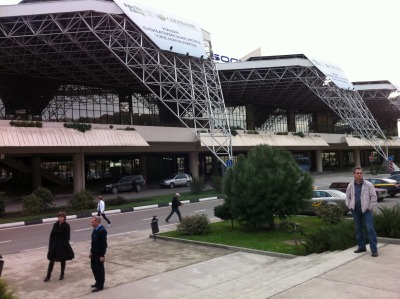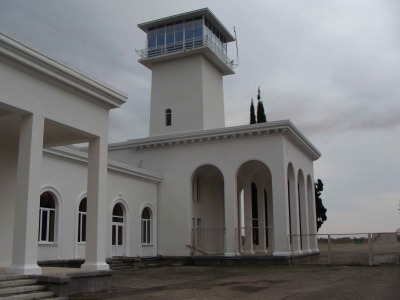I returned from Sukhum to Russia on Friday, December 3. It takes between 1/12 and 2 hours to reach the border. Fortunately, almost no one was at the border, so I quickly was over the bridge, through passport control and customs and on the Russian side.
On the way from Sukhum to the border, I asked the taxi driver about the war in 1992-93 and if he had been in Abkhazia at the time. He told me he had fought in the war, been wounded and evacuated to convalesce in a hospital for several months. He also lost both his brother and father in the fighting. In a country that lost about 4 % of its population in combat, almost no family was left untouched by tragedy.
Despite this, Arsen was upbeat about the future in Abkhazia. Like me, he believes that there are great changes coming to Abkhazia. Like most Abkhaz, he is uncertain exactly what form it will take, but he believes that tourism is going to be the backbone of growth. The day before in Sukhum, I explained at length to and accomplished local businessman about a contact I had with a well-known insurer of unusual risks. I told him that if this firm would "rate" the political risk in Abkhazia and if the cost was economical, it would help draw investment capital at much lower cost. Initially, he was unfamiliar because most Abkhaz have not been exposed to western capital market information. However, he quickly grasped what this would mean. Of course, this is not the only way forward and there are a lot of other scenarios for capital to enter the country. It is apparent that there are other investors who see what I see in Abkhazia. I saw several foreign business groups and there are already Turkish entrepreneurs engaged in retail and restaurant businesses. Tim Post, an American Krasnodar-based entrepreneur who has is becoming well-known in the Russian language internet and who developed BarCamp Krasnodar, toured Abkhazia with me the previous week. Tim was very enthusiastic. He said "Abkhazia is what you get if Rancho Sante Fe "married" New Zealand." and when talking about development possibilities Tim thought that Abkhazia "is analogous to discovering another Hawaii. If political events break favorably, this "middle earth" kingdom will be one of the most sought after in Europe."
When I got back across the border, I had to change my ticket for my return to the US at the airport before I went to the train station. On the way, I was delayed by traffic due to Russian President Medvedev's arrival. The Sochi/Adler Airport is an impressive and modern facility, by any standard.

I saw the new high speed rail connecting Sochi/Adler with Krasnaya Polayana, the site of the Alpine events. I am often in the area, but even so I noticed a lot of progress since my last trip through in October. Including event venues there ore than 200 new projects scheduled to be completed in time for 2014. Watch for more information here on Sochi going forward.
 Post a Comment
Post a Comment  Thursday, January 13, 2011 at 7:07PM
Thursday, January 13, 2011 at 7:07PM 








